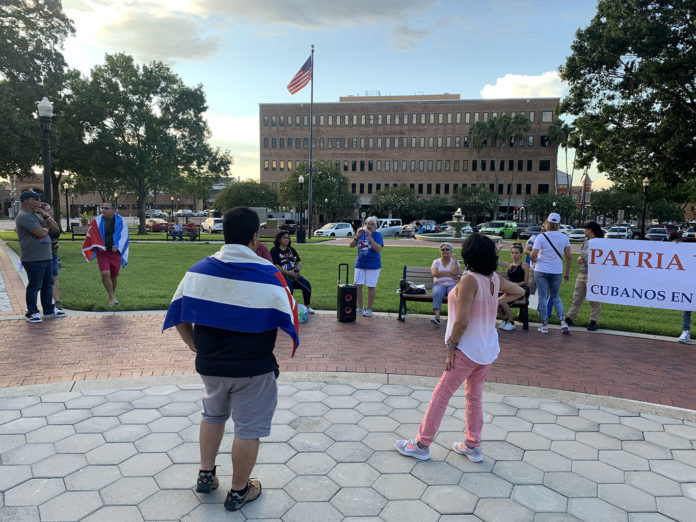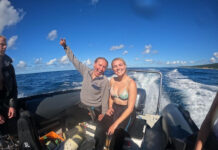
Salvatore Ambrosino
Following the country’s largest protests in decades, Cuban Americans in Florida have assembled this week to call down the reigning political party in Cuba—many of them deeming it a brutal dictatorship.
Outside of Lakeland’s Buena Block Party on July 17 the “#SOSCuba” protest song “Patria Y Vida” played, and the saying was written on the largest poster board carried around by the demonstrators in Munn Park. It translates: “Homeland and Life,” an optimistic twist on the ruling Communist Party of Cuba’s infamous, decades-old motto “Homeland or Death.”
Two of the organizers, Maruchy Alfonso and Arelis Vera, say Lakeland’s Cubans have been spurred into solidarity with their homeland’s fight for freedom and they have begun hosting daily meetings within their community on the state of governance in Cuba.
In the past months, Cubans have faced a searing economic decline, leading to shortages in food and medical supplies as basic as penicillin and aspirin. Many of these hardships were rarely faced since the collapse of the Soviet Union in the 1990s. The hunger-fueled anti-government protests in Cuba, exacerbated by police violence and a deadly coronavirus outbreak, have been the strongest challenge to the 60-year-old regime in decades, leading many Cuban-Americans to join protests in the United States. The dissent has been especially vocal in Florida, where in Tampa and Miami the largest assemblies in support of the Cuban resistance have taken place.
Alfonso had a microphone and a cord ran through her hand to a small speaker on the ground, many stood wrapping themselves in La Bandera de Cuba, listening to her as she objected to the Cuban government’s recent aggression towards its detractors. Her demands were clear.
“I want support,” Alfonso said. “I want President Biden to put his eyes on Cuba. We are the Cuban-American people.”
In light of kidnappings alleged by families under Cuban President Díaz-Canel’s administration, the anger from international protests rage on.
“People go missing for thinking differently,” one protestor said, who wished only to be known as Joel. “Something extremely odd is happening in our country.”
Cuban law has placed de facto limits on speech, assembly and expression. Vera, who fled from the island eight years ago, predicts the Cuban government will not loosen its perceivably tight grip on citizens protesting to regain rights progressively lost since an armed revolt resulted in Fidel Castro taking power as Prime Minister in 1959.
“Military intervention. The Cuban government is not answering the requests of the people, they aren’t going to do anything, what we are asking for is an intervention,” Vera said. “There are mothers there who don’t know where their sons are.”
“There’s no way you can work and live with your salary,” Vera said. Rice, a bottle of oil, and a few eggs for the month, Vera recalled the short list of items from an old shopping list she had while in Cuba—what she could afford with her monthly salary. While some people in Cuba have recently rallied in support of the government, she says those are the people who have something to lose or are higher-up in the Cuban labor hierarchy. The ones protesting, Vera said, have nothing.
“They are sick. They do not have food. They are dying in their homes,” Vera said. “We were not brave enough to do what they are doing now.”
After pressure from the United States, Cuban cabinet ministers announced measures meant to alleviate the economic fallout of the country. This would include permits for travelers to import food and medicine and also allow people to use their ration books to obtain food outside of their hometown.
“Positive measures, but they are insufficient,” Cuban economist Omar Everleny Pérez said to the Associated Press.
Many of Cuba’s recent hardships have been blamed by many on America’s Cold War Era embargo on the island amongst many sanctions, recognized by the U.N. as an economic blockade that has yet to see its end. Many like Vera who call it an “internal blockade” instead cite the regime’s hesitance to accept aid from non-governmental organizations (NGOs).
Native Cuban author and professor Dr. Jose Manuel Garcia said there is evidence to substantiate the detractors’ claims and cannot say for certain that the embargo alone is the cause of Cuba’s economic distress.
President Biden and Gov. Ron DeSantis have both expressed support for the protestors in Cuba, DeSantis pressing Biden on an agenda to help provide internet to Cuba after it had been cut by the government, hindering communications from the island.
While his opinion on intervention is conflicted, Garcia noted that the main goal of the United States at this point should be to protect communications on the island.







